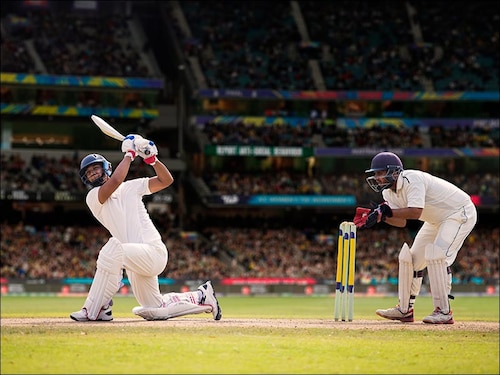Major Events, Major Impact: Strategies to capitalise on events to boost retail s
Cricket to Diwali: Mastercard helps unravel the impact of major events on consumer spending


In India, we bleed blue. Cricket is enmeshed with our childhood memories, who we choose as friends, what we do on weekends, and how we spend our money. So much so, that cricket matches in India create their own little uptick in economic activity. An analysis of aggregated and anonymised Mastercard data found that the IPL series played in 2023 led to a 25% increase in in-person average daily spend in restaurants during match days vs. non-match days.
That makes sense: a large-scale sporting event like the multi-week extravaganza of the ICC World Cup brings together friends and family to cheer for their teams, gives companies a great option for outings, and of course, brings fans in from all over the globe. Restaurants and sports merchandise aside, this also greatly boosts hotels, airlines, car rentals and taxi services. The ICC Men"s T20 World Cup hosted in Australia in 2022, fueled growth in spending in hotels and restaurants by outbound travelers from South Asia from early October to mid November.
While cricket makes for large numbers, other sporting events also see a similar uptick in retail, lodging and restaurant spending, as do concerts, large conventions and trade shows, fairs and exhibitions. Brands can leverage major events to capitalize on the increased traffic by extending operating hours to accommodate shopping before or after the event organize contests and giveaways launch targeted advertising campaigns that piggyback on the popularity of these events and of course, prompt event specific offers.
A convenience retailer capitalized on the surge in spending during a major televised sporting event weekend using a new digital food offer that provided a discount for purchasing large meal bundles during the event. Using Mastercard Test & Learn® to measure the effectiveness of the campaign, the platform first identified control customers that behave in lockstep with test customers based on historical spend pattern and loyalty tier, enabling confidence in the accuracy of results. Test & Learn® then segmented the results based on the strongest drivers of performance to identify opportunities to optimize similar initiatives in the future
Test & Learn® measured a 2% increase in transactions as a result of the offer and found that it was most successful for two customer groups: customers who spent less than $10 on their last transaction and lapsed customers who hadn"t shopped with the retailer in the last 30 days. These insights helped drive an incremental $600,000 in sales from the next two-week campaign.
While effective marketing during a major event can provide a boost to sales, breaking through the clutter of a crowded environment can be challenging. A global bank orchestrated a compelling social media campaign during Diwali, India"s major festival, in collaboration with Mastercard. The campaign"s primary goal was to propel engagement for the bank"s card portfolio, leveraging the influence of key social media personalities from the entertainment industry.
The strategy unfolded with the creation of vibrant and festive content, perfectly aligning with the jubilation surrounding Diwali. With a keen focus on driving spending in the dining and travel sectors, the campaign radiated the theme of "live the celebrations" and "live the festivities," encapsulating the spirit of the festival. The results were spectacular.
Employing a coordinated approach across various channels, including video, rap music, user-generated content, print ads, outdoor billboards, and mall ads, the campaign reached an impressive 45.2 million consumers and generated over 250 million impressions. The campaign surpassed its ambitious target goals by far, generating 62 million video views, where the target was just 14 million.
In the aftermath of Covid mobility restrictions, consumer preferences have shifted to value experiences over things. While not everyone can attend major events in person, brands can help bring these experiences home to the fans. Making people feel like they’re part of the event can contribute to the overall strategy to capitalize on an event and create stickiness for the brand.
Some brands employ interactive content like event-specific games on their websites or apps, while others offer real-time match updates with statistics, insights, polls, and interactive quizzes. Exclusive event-related merchandise, giveaways, and personalized experiences are also part of the arsenal to make major events a meaningful and enjoyable segment of the customer journey.
A standout example of this approach comes from Tottenham Hotspur, a consistent leader in the Premier League. Embracing their motto "To Dare Is To Do," the football club partnered with Dynamic Yield by Mastercard to revolutionize its e-commerce business, increase revenue and drive loyalty. By leveraging Dynamic Yield"s algorithmic capabilities to match content, products, and offers to individual customers across digital channels, Tottenham crafted a personalized customer journey for each visitor.
Tottenham and Dynamic Yield reimagined the mobile website, optimized the conversion funnel and crafted unique experiences around major events, such as match results and the launch of new uniforms, known as a “kit launch." This dedication to personalization paid off swiftly, yielding positive ROI in just one month.
In the aftermath of major events, a critical aspect of any marketing strategy is the meticulous analysis of results to refine future approaches. Post-event evaluation entails assessing the justification of invested resources and the effectiveness of messages and visuals. This reflective process is paramount in enhancing the impact of future campaigns, allowing businesses to adapt and optimize their strategies based on valuable insights gleaned from previous endeavors.
Illustrating the significance of thorough analysis, a prominent consumer packaged goods (CPG) company in the U.S. navigated the challenge of measuring the impact of its game-day ads during a major football event. Faced with the absence of a valid benchmark due to the nationwide reach of the ads, the company employed Mastercard Test & Learnâ„¢.

Test & Learn® with Causal Inference uses machine learning that capitalizes on proprietary Mastercard data and correlated market datasets to accurately quantify the performance impact of these large-scale initiatives like football game day television ads. The results were illuminating, as the CPG company successfully quantified the true impact of its ad, revealing a substantial $1.3 million in incremental sales across multiple products. It underscores the pivotal role of advanced analytics in measuring and optimizing the effectiveness of marketing initiatives tied to major events.
In a world where consumers are hungry for experiences and for connection, major events ultimately bring every type of consumer to the field. Companies seeking to capitalize on festivals, holidays, sporting events, concerts and more can get their brands on consumers’ minds with event-driven retail campaigns.
What we measure, we deliver. Measuring and analyzing enables brands to track and replicate success and grow sales and customer engagement with each event and campaign they undertake.
Find out more about how Mastercard supports brands"¯across various industries here.
The pages slugged ‘Brand Connect’ are equivalent to advertisements and are not written and produced by Forbes India journalists.
First Published: Jan 31, 2024, 16:07
Subscribe Now